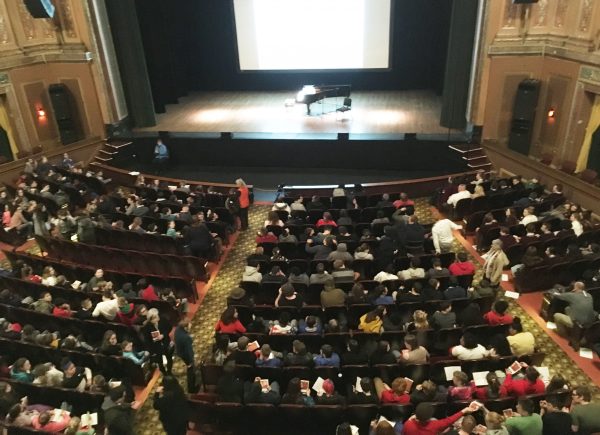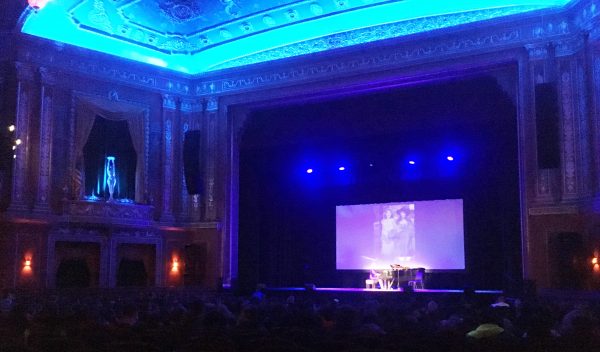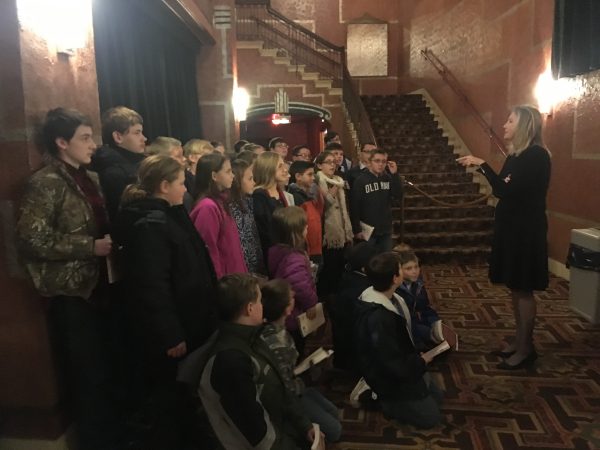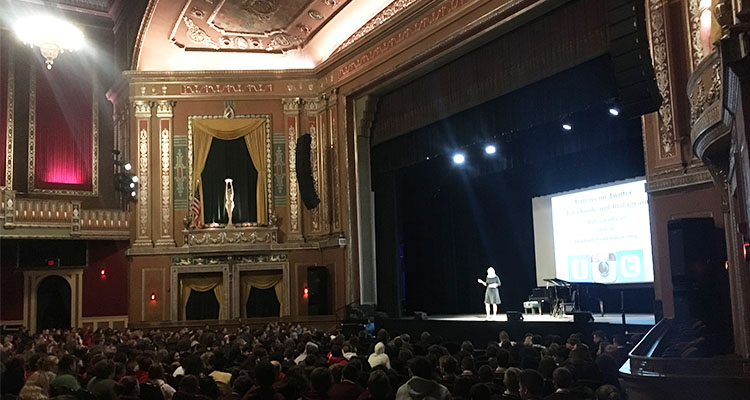It was soggy and gray as I headed for The Capitol. I was going to see a performance that I only vaguely knew to be about children and the Holocaust and a pianist. There was a yellow bus at the curb by the marquee The lobby was packed. Sardines. I haven’t been in such close quarters with so many school kids since I was one myself.
The students were there to see The Pianist of Willesden Lane, which was brought to town by Classrooms Without Borders-Wheeling. CWB was founded in 2011 by Dr. Zipora Gur, in association with the Jewish Federation of Greater Pittsburgh. The organization aims to “connect the lessons of the Holocaust to international current events” and “imbue participants with values and beliefs that encourage empathy for contemporary issues.”
I managed to squeeze into a person-sized niche, up against one of the front doors, from which I surreptitiously observed a romance blooming an arm’s length away, as well as the nimble navigating of the fray by friends hoping to position themselves in line for seats together. A voice sounded through the din, and a gaggle moved forward, the crush becoming an orderly ingress.
Inside, the theater’s seats prescribed enough personal space to breathe freely again. The stage was set with a piano and a projector. Teachers negotiated with their charges appropriate pre-show volume levels and position jockeying. The lights went down.

——
“What was really needed was a fundamental change in our attitude toward life. We had to learn ourselves, and furthermore, we had to teach the despairing men, that it did not really matter what we expected from life, but rather what life expected from us.”
This is the thinking that Viktor Frankl said was required to live through the concentration camps. Frankl survived Auschwitz. He was a psychiatrist who found himself at the epicenter of man’s inhumanity to man — yet found a way to live.
I picked up Man’s Search for Meaning again, after discovering it in an ethics class seven years ago, because I felt that I still have much to learn from it, that the world still has much to learn from it, and that it might inform my reception of the performance I was about to see.
Man’s Search for Meaning is the book Frankl wrote to document his experiences in the camps; those pages were also the soil for a new psychotherapy: logotherapy. Rather than seeking the resolution of Freudian childhood conflicts as a path to better mental health, logotherapy is a therapy of meaning. Frankl aimed to help people sort out what made life meaningful to them; he engaged in existential analysis. Working toward a creative or productive goal, and engaging in an intimate relationship were two broad streams of meaning he found people living for. A third way was stark. He suggested that even suffering could be meaningful if embraced head on. Facing your lot with dignity could be a source of meaning — even when your lot was dislocation, starvation, degradation and ultimately, annihilation.
——
A lone woman took the stage. I didn’t yet know she bore an intimate connection to survivors of the Holocaust. And victims. I’d taken a seat some rows back of the students, both to escape being found a novelty by them (there were only a few handfuls of adults in the theater), and to take in the scope of the event.
For the next hour, the woman spoke while images of Vienna and London, children and soldiers, and horror and perseverance appeared behind her. At the same time, she took to the piano; she wove snippets of Grieg, Beethoven and Debussy in with her storytelling, deftly playing and narrating at once.
The woman was Mona Golabek. The performance was about her mother, Lisa Jura, who fled Austria for England as the Nazis were beginning their march on the Jews. In 1938, Lisa was a 14-year-old who dreamed of being a pianist. She had two sisters, and parents who fostered her burgeoning abilities with piano lessons. As threats of German ambition became realities, Abraham and Malka Jura considered their daughters’ futures.
Abraham won a ticket for the Kindertransport in a card game. This was an effort to bring Jewish children out of Germany, Austria, Czechoslovakia and Poland and into the United Kingdom. Children were placed in whatever makeshift situations the British could muster: farms, schools, foster homes.
Abraham won one ticket for the Kindertransport, though, one place, for one child. Mr. and Mrs. Jura had an abysmal decision to make. They chose Lisa. Malka saw her off with these words: “Hold on to your music. It will be your best friend in life.”

——
“We needed to stop asking about the meaning of life, and instead to think of ourselves as those who were being questioned by life — daily and hourly. Our answer must consist, not in talk and meditation, but in right action and in right conduct. Life ultimately means taking the responsibility to find the right answer to its problems and to fulfill the tasks which it constantly sets for each individual.” —Viktor Frankl
How about that for a question from life to the Juras: Which of your daughters?
Did they do what is right? Who’s to say. They certainly did something good, in securing safe passage for Lisa, but would it have been better for the family to stay together?
These are the kind of quandaries that make me see how one might respond to life like the existentialists, to conclude that life has no intrinsic meaning and that the only meaning open to us is contingent and individual, for the grand narratives have lost their bite amidst the atrocities of the 20th century. Or is this the very kind of noodling — “talk and meditation” — that Frankl is advising against, when one should instead be engaging in “right action and right conduct”?
——
That turned out to be the last time Lisa saw her mother, those words the last a mother spoke to her daughter, on the railroad platform before the train that was the first leg of the Kindertransport pulled out of the station. Abraham and Malka Jura died in the Holocaust; their two other daughters survived.
Lisa made it through years in the various living arrangements cobbled together in England — one of which was located at 243 Willesden Lane, from which the performance takes its name — by sticking with her music. By day, she worked as a maid and sewed army uniforms; by night, she practiced on a piano in an orphanage basement. She won an audition and was accepted into the Royal Academy of Music in London, which led to a career as a concert pianist and teacher. Lisa had two daughters, Renee and the woman who had just told us this story, Mona Golabek.
Mona learned the piano from her mother and became a performing pianist in her own right. Inspired to share her mother’s story, she wrote the book The Children of Willesden Lane and the play we had just watched, The Pianist of Willesden Lane. She founded the non-profit Hold On To Your Music (which brought this performance to the Capitol Theater in collaboration with Classrooms Without Borders) to educate the next generation about the Holocaust and to bring a message of hope and inclusion to all.
——
The lights went up and Mona took questions.
“How did you feel writing the story?” a student asked.
“I kind’a woke up one day and just thought I wanna tell [my mother’s] story,” Mona explained. “You’re looking at someone who never gave up. My message to all of you is that if you’ve got a dream, if you’ve got a story within you — go find the passion that is gonna get you through. You’re looking at someone who had that dream and worked and fought for it, and you can do the same. If you have enough fire inside of you and belief and faith, you can do that.”
Another perceptive student ventured this: “What does the number 158 mean to you?”
That number, printed on a card with a string affixed to it, had been placed on Lisa when she arrived in England from the Kindertransport; it was a device to help the children be distinguished from one another as they arrived en masse.
Mona discussed the resonance of this numbering to the tattoos the Nazis put on Jews to serialize them, treating them as objects to be categorized and disposed of. She talked of seeing these markings on people she’s met over the years researching the book and play.
She also spoke of the sacrifices that brought the war to an end. “You know what’s the greatest moment for me in this play, guys. It’s those crosses on the beaches of Normandy. Those people that gave their lives, they weren’t much older than you folks. They gave their lives so that we can all walk in freedom. This is the greatest country on earth. We may have differences of opinion and be of different political views, but we get to walk in freedom and express that. And as long as we do it with respect and decency to our fellow neighbors and humanity, that’s the greatest gift possible.”
——
The questions were respectful and earnest, with one half-playful comment thrown in.
“I like your accent,” one boy stood up to proclaim.
He was referring to the inflections Mona used in giving voice to people living in various parts of Europe. And he seemed to get the jolt he was going for out of his compatriots at his bit of cheek. The levity was welcome, at least to me, after a heavy performance.
With the show over, the students became again a buzz of talk and frenzied gesticulating. In the lobby, classes formed tiers for pictures with Mona, and some students waited patiently to have their books signed. Gradually, there weren’t any kids there, no more shouts and nervous energy, as each group took their leave.
 To see children packed into the Capitol lobby until you could barely move, then in lines to make their way to their seats, then cramming onto buses, then nothing — it made for strange resonances.
To see children packed into the Capitol lobby until you could barely move, then in lines to make their way to their seats, then cramming onto buses, then nothing — it made for strange resonances.
As I stepped outside and headed back to my place, I noticed three fluorescent camp chairs on the sidewalk: the Christmas parade would be that night. And I walked on, thankful to be in a place where children would be free to frolic in the streets without fear.
A line of Mona’s bounces around as I write this: “I really wish I didn’t have to tell this story.”
Me too, Mona, me too. But I’m glad you did.
——
In the weeks since the performance, I corresponded with Jackie Shriner, a 10th-grade language arts teacher at Wheeling Park High School.
Ryan: What was your impression and/or your students’ impression of the performance? I love classical music, so for me, the interweaving of music and narrative was powerful. I have a listening knowledge of most of the pieces, but of course in an utterly different context. I’ve listened to this music in quiet rooms, in a free society.
Jackie: We were very grateful to be able to attend the performance. My students were so appreciative of being able to hear the story and listen to the music. For many, they had never been to a performance of any type, so it was a unique experience for them.
My students made comments:
Students: It was emotions that words could not express.
She was very entertaining. I wasn’t sure I would like it, but it ended up really being worthwhile.
It gave me a better understanding of the story. It was really cool to hear it from the author herself.
Ryan: How has studying the book enriched the experience of seeing the play and vice versa? I didn’t know about this story until just a few days before the show, and I knew none of the details. Mona’s story fell on me like the bombs on Britain, one gut-wrenching turn after another. I was struck by hearing that Mona has visited her mother’s blind childhood companion. This brought home to me how recent WWII still is, that there are those living who know that horror firsthand.
Jackie: When the opportunity to teach the book presented itself, I was hesitant only because I was not sure how the students would respond to the story. After reading the book over the summer, I was excited to teach it not only because the Holocaust is a part of history that needs to be studied, but also because in today’s world we must work to teach toleration and acceptance of all people regardless of race, ethnicity, religion, etc.
Ryan: How do you think your students relate to WWII and the Holocaust? Is it a part of their world? I know for me, 9/11 woke me up to the fact that history is a record of real people and I am living in history. That event dissolved the illusions I had that I could be a passive observer of the world.
Jackie: We did a lot of historical study to understand the story and emotions of the literature. We had just finished learning about Kristallnacht when the tragedy in Pittsburgh occurred. That really made anti-semitism real for the students in a horrible way. I used the tragedy to do some additional work about intolerance.
Ryan: Is there anything else you would point out to Weelunk readers?
Jackie: This was a very worthwhile event for the students. It motivated them to want to learn more about the Holocaust and story, also. When we can provide opportunities for students to learn and grow academically and emotionally, it is a win for the students because they are gaining skills for the real world. I truly would like to thank Classrooms Without Borders for providing this opportunity to my students.
——
“For the world is in a bad state, but everything will become still worse unless each of us does his best. So let us be alert — alert in a twofold sense: Since Auschwitz, we know what man is capable of. And since Hiroshima, we know what is at stake.” This is how Victor Frankl ends Man’s Search for Meaning.
Mona Golabek has clearly found a path to meaning and to bettering the world through her performing and educating, just as her mother dove into her music to get her through the war.
Would that we all might find a vocation to fulfill us and console us for the trials of life. Would that we might set ourselves a task so engaging that we never need sit for Frankl’s logotherapy. Would that we might divert the next great war to end all wars.
Would that we might heed the words of the daughter of the pianist of Willesden Lane to her young audience that day at the Capitol a few Fridays ago: “You are the young hope. We’re looking for you to become the leaders, to stand up.”
Classrooms Without Borders will host another event, the one-woman play, “Etty” at 2 p.m. Sunday, Dec. 2, at Temple Shalom. The play is adapted from the diaries and letters of Etty Hillesum, a 28-year-old Jewish student living in the German-occupied Netherlands. As the world closes in around her, Etty digs deep into her soul to root out hatred and bitterness, and finds a freedom within herself that is unshakeable. Using only Etty Hillesum’s words, the play presents one woman’s struggle to sustain humanity in the face of brutality. Author Susan Stein picked up the diaries in 1994 for 50 cents at a yard sale thanks to the recommendation of a friend. After reading the diaries, she wanted to give something back to Etty by bringing her to people who might not read the diaries themselves.
• Ryan Norman hails from a suburb of Cleveland and earned an English degree at Wheeling Jesuit University. He lives in East Wheeling where you might find him listening to Gustav Mahler or Keith Jarrett, reading David Foster Wallace or Dave Eggers, and thinking along with Martin Heidegger and Roger Scruton. Ryan is also a chorister at St. Matthew’s Episcopal Church and a member of The Prosers, a group that performs original poetry and prose at Towngate Theatre.


